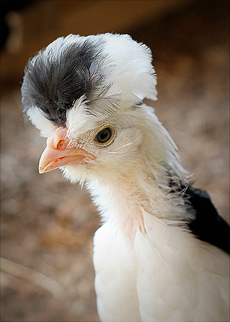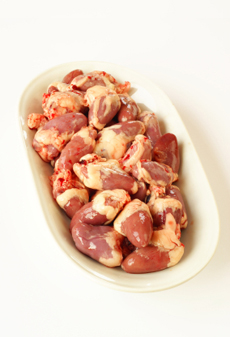 A plate of chicken hearts, part of the giblets. Photo by Hipkorat | IST. A plate of chicken hearts, part of the giblets. Photo by Hipkorat | IST.
September 2011
Last Updated March 2023
|
 |
Chicken Glossary: Chicken Part
Page 5: Chicken Terms G To M
This is Page 5 of a seven-page chicken glossary, including chicken parts. Click on the black links below to visit other pages. Check out almost 100 other food glossaries: details on all of your favorite foods. Also see our Egg Glossary.
This glossary is protected by copyright and cannot be copied in whole or in part.
|
GIBLETS
Edible parts of the bird that are not dark meat or white meat: specifically, the gizzard, heart, liver, and neck. They can be cooked in soups or stews and added to rice dishes and stuffing. Centuries ago the term had another meaning: in Old French and Middle English, gibelet was a stew of game, gibelotte a rabbit stew.
GIZZARD
An organ that contains grit for grinding up the grain and plant fiber a chicken eats. It’s part of the giblets that come with a whole chicken and is chewy and delicious.
|
|
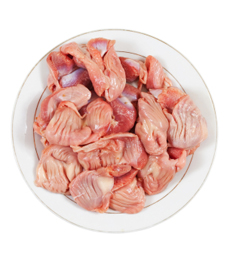
A plate of raw chicken gizzards. Photo by Jack F. | IST. |
GROUND CHICKEN
Boned chicken that has been ground in a meat grinder. If you are purchasing it (as opposed to grinding it yourself), check the label to understand what you’re getting. The leanest option is white meat only, no skin, about 3% fat, and is labeled “ground chicken breast.” Regular “ground chicken” is generally made from white and dark meat with some skin, and has about 10% fat. Some options may be all dark meat with skin, comprising about 15% fat.
|
HALF CHICKEN
The bird is split from front to back through the backbone and tail to produce two halves of approximately equal weight. The upper half (the breast and wing, or breast quarter) is white meat; the lower half (thigh and drumstick, or leg quarter) is dark meat.
HEN
A mature female chicken. The hen is the egg layer. Hens will continue to lay eggs as they age, but the number will decrease over time. The most eggs are produced during the first one to four years of laying. When their production is no longer profitable, they are turned into stew chickens.
|
|
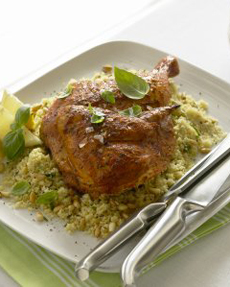
A half chicken: breast, wing, thigh, and drumstick. Photo courtesy Chicken.org.au. |
|
HOCK
A chicken’s hock is the joint where the thigh bone meets the shank bone, similar to a human ankle. It is also known as the ankle joint. It has a unique texture because it is mostly just skin, tendon, and bone. The hock is located in the middle of the leg, and it bends when the chicken walks. Trivia: Chickens stand and walk on their toes. Most chickens have three toes that point forward and one that points back. Some breeds of chicken have five toes on each foot.
HYBRID
The offspring of a hen and rooster of different breeds, each of which might themselves be crossbred; often erroneously applied to the offspring of a hen and rooster of different strains within a breed.
|
|
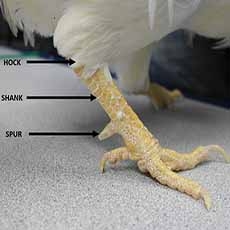
Parts of a male chicken’s leg—you can tell it’s male from the spur (image © Dr. Jacquie Jacob, University of Kentucky, via Poultry Extension Website). |
INCUBATE
The process of hatching fertile eggs, which takes place in an incubator, a device that provides warmth and other favorable conditions. According to The History Of Food, the Romans are believed to have invented the incubator by keeping egg-filled chambers warm with hot mist. The Egyptians and Chinese before them kept the eggs in warm ovens.
|
LEG
The leg of the chicken is the thigh-drumstick combination. It is all dark meat. The whole leg differs from the leg quarter in that it does not contain a portion of the back. Some markets sell a boneless, skinless leg: the whole leg with the skin and bone removed. Boneless, skinless thighs are available, as well.
LEG QUARTER
The leg quarter comprises the drumstick, thigh, and lower back.
|
|
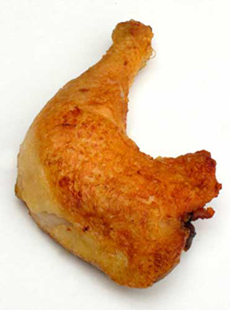
A chicken leg. Photo courtesy FarmersBBQ.com. |
MINIATURE CHICKEN
A miniature chicken is different from a bantam chicken. While bantams are very small breeds (and should not be confused with young chickens, or poussin), up to half the size of a standard chicken, a miniature chicken is a smaller version of a standard-size chicken. Most large chicken breeds have a miniature counterpart. Miniatures are usually one-fifth to one-quarter the size of the standard breed, but they should exhibit all of the standard breed’s characteristics.
This glossary is Lifestyle Direct, Inc. All rights reserved. Photos are the copyright of their respective owners.

|


 A plate of chicken hearts, part of the giblets. Photo by Hipkorat | IST.
A plate of chicken hearts, part of the giblets. Photo by Hipkorat | IST. 



